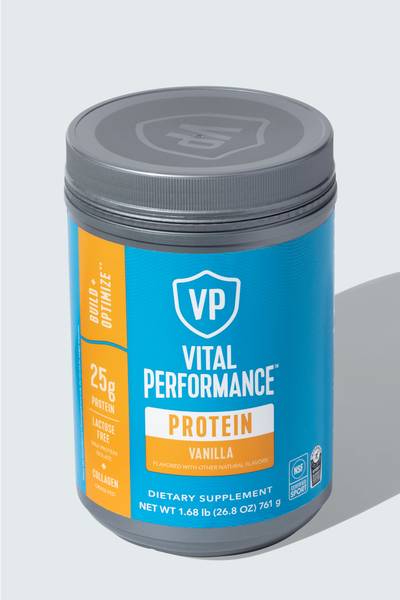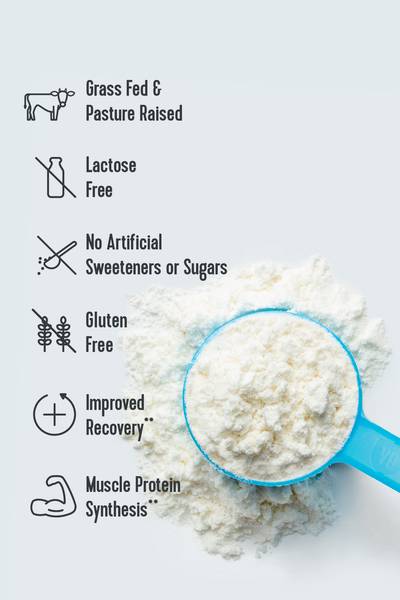Marathon training season is here! After a year of canceled races and disappointments, the starting line is so close you can taste it. Worried you might've lost some speed in a year without in-person competition? Same.
We tapped running experts for tips on how to improve your running speed, so achieving that PR is closer than ever. Read on for more — and join our Vital Run Club for some extra motivation!)
Vital Note: This article has been made available for informational and educational purposes only. It is not intended to be a substitute for professional medical advice, diagnosis, or treatment. Always seek the advice of your physician or another qualified health provider with any questions you may have regarding a medical condition. Your licensed healthcare professional can best provide you with the diagnosis and treatment of any medical condition and assist you as well in deciding whether a dietary supplement will be a helpful addition to your regimen.

How can I run faster?
Feeling the need for speed? There are four key ways you can improve your running speed, according to Sophie Rambaud, Running, Strength, Mobility Expert and NASM Certified Personal Trainer.
- Speed Work
- Strength Training
- Body Control and Stability Work
- Proper Running Form
Speed Work
The key to success with these is incorporating them gradually by following a rule of 80/20. "Around 80 percent of your miles should be slow, easy miles and around 20 percent are fast miles," says Tammy Whyte, Running Coach and Owner of TW Training and Wellness. "This allows the body to run more miles without injury, which will increase aerobic capacity, as well as run really fast on the fast days."
Looking for a specific workout recommendation? Try 200m repeats with a 60-120 second rest in-between (you can complete between 6 and 12), suggests Rambaud.
Strength Training
You should include both power and strength repetitions (like 2 to 5 sets of 2 to 6 heavy reps) into routine, says Rambaud. "This helps stimulate your whole body in a different way allowing you to cause neurological and muscular changes in your body to run more efficiently and faster," says Rambaud.
A sumo deadlift is another go-to strength training move.
"This is a very good hip dominant and posterior chain (working your backside) movement to give you benefits along with single leg work," Rambaud adds.
Body Control & Stability
This is important to help improve running speed because "when we run, we are on one leg 100 percent of the time, meaning you need and want to be able to have good body control and stability," says Rambaud.
Unilateral moves, such as single-leg deadlifts and split squats can help build this stability — and help you identify any weaknesses that may cause injuries down the line.
Additionally, Rambaud often has her athletes perform strides. She recommends four to six strides (around 100m) one to two times a week. This should be done at an all-out speed, while maintaining good form. Take as much rest between as needed for quality reps.
Proper Running Form
Completing drills which help you mimic the motions of running and improve running form are great, too. “Something that can be done in the gym that translates to this are box jumps - again not performing these as high reps or as fast as possible with little rest, but QUALITY reps,” says Rambaud. “[Another] personal favorite is sled pushes or pulls. When I know a race has a lot of hills (or down hills), I love a good sled pull.”
Related Articles
How can I improve my running stamina?
While that final kick at the end of the race is important, let's talk about running stamina. You've gotta be able to make it all 26 miles to kick the final 0.2 — and feeling winded during a run of any length is never fun! — it takes time and patience to acquire.
"You will only get better at running longer distances if you run longer distances and run consistently," says Whyte. Her recommendation? When starting out, or increasing your distance, is a great way to go for longer distances if you can't run all at once is splitting it up into a walk/run, or starting with a shorter duration. And rather than focusing on miles, focus on time on your feet.
"I would do a short, 20 to 30 minute run, every other day to start, and you can add a little time to one to two of those runs each week to slowly increase your stamina."
While doing this, a few tips to keep top-of-mind. Breathing should be controlled and at a conversational pace. Many runners run too fast too often and then get hurt — which doesn't help their speed or stamina.
"Slowing down runs and doing more of them will help build both stamina and speed,” says Whyte.
To help increase stamina, here are some tips Rambaud suggests.
- Slow Down. Try an easy run — this should be at conversation-holding pace. Perform Intervals. For example, one can start with 8 x 400m with two minutes rest, and record all 400m times. Two weeks later you can repeat the same workout but cut the rest by 30 seconds and go the same speed as two weeks ago. This would show a measure of improvement!
- Add Fartleks To Your Training. Consisting of a blend of distance and interval training, fartlek training utilizes speed variations to help you build stamina and endurance. (Check out our guide to Farlek workouts here)
- Complete a long run. This can start at three miles and build from there at an easy to medium pace.
- Try heart rate training. While this may not work for everyone, it can help you gauge your efforts to avoid overtraining.
Can I increase my running speed in 2 weeks?
We get it, you want to see your running speed improve quickly! But, this is where planning comes in. You shouldn't wait until the week before race day to add in strength training and speedwork.
"At the end of the day running speed comes with time and proper training. It cannot happen overnight as much as we would hope. Implementing strength training will not only help increase speed but decrease the likelihood of injury," says Rambaud.















